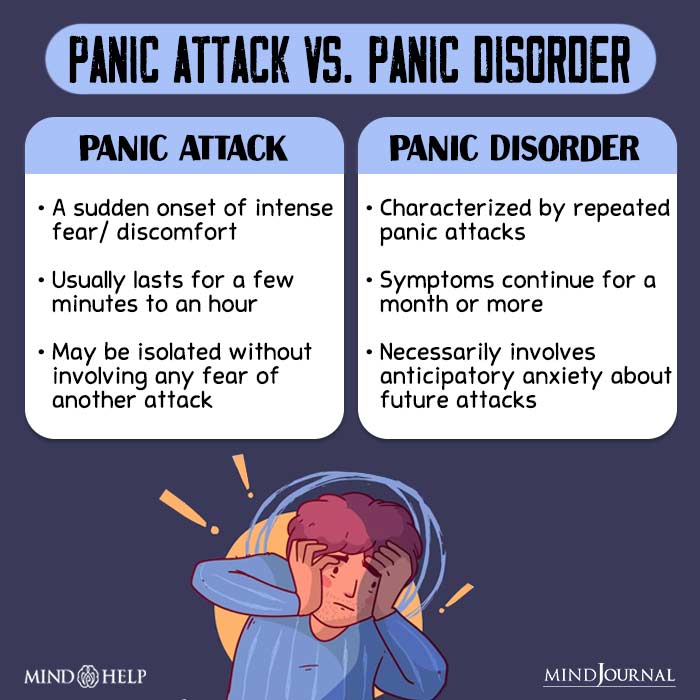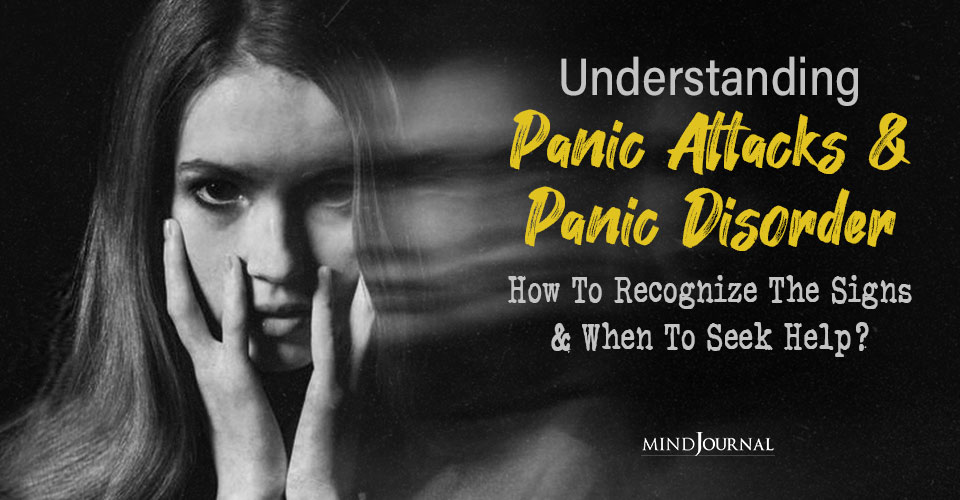Panic disorder awareness is crucial for destigmatizing mental health issues and encouraging those who suffer to seek professional help.
Fear and anxiety are natural responses to certain situations and stressful events. But sometimes, these feelings can become overwhelming and occur without a clear cause or apparent danger. This may then be called a panic attack. When panic attacks become a regular occurrence, it could lead to what’s known as panic disorder.
So, let’s dive into what panic disorder is, how to recognize its signs and symptoms, and explore available panic disorder treatment options. By spreading panic disorder awareness, we can better support those affected and promote mental well-being.
Understanding Panic Disorder
According to the DSM-5, a panic attack is defined as “an abrupt surge of intense fear or intense discomfort that reaches a peak within minutes.”
Panic disorder is more than just occasional panic attacks. It is characterized by at least a month of ongoing worry about having more attacks or their potential consequences.

A person with panic disorder may experience symptoms such as racing heart, shortness of breath, and sweating or chills. These attacks usually last between 5 to 20 minutes, but in severe cases, they can go on for more than an hour.
People with panic disorder mostly have these attacks out of the blue without any obvious cause, though sometimes they can be triggered by certain events or situations.
Recognizing the Signs
Panic disorder is characterized by sudden, intense bouts of fear known as panic attacks. Panic disorder symptoms include:
Physical Symptoms
- Rapid heartbeat or palpitations
- Sweating
- Trembling or shaking
- Shortness of breath
- Chest pain
- Dizziness
- Nausea
- Chills or hot flashes
- Numbness or tingling sensation
- Muscle tension
- Upset stomach

Psychological Symptoms
- Intense fear
- Persistent worry about having another panic attack
- Hypervigilance
- Difficulty concentrating
- Feelings of helplessness
- Fear of dying
- Derealization i.e. feeling of unreality)
- Depersonalization i.e. being detached from oneself
Triggers and Patterns of Panic Disorder
The exact cause of panic disorder is not known, but here are a few common events or situations that might trigger panic disorder symptoms:
- Stressful life events – Major changes such as a job loss, divorce, or the death of a loved one.
- Medical conditions – Health issues like thyroid problems, heart conditions, or respiratory disorders.
- Substance use – Caffeine, alcohol, drugs, or withdrawal from these substances.
- Phobias – Specific fears, such as flying, heights, or crowded places.
- Genetics – History of panic disorder or other anxiety disorders in the family.
- Trauma – Past traumatic experiences such as being the victim of physical or sexual abuse or childhood abuse.
- Environmental factors – Stressful environments, including work or home life.
Patterns of Panic Disorder
Panic disorder often follows certain patterns:
- Unexpected attacks – Panic attacks occur without warning and without an obvious trigger.
- Frequent occurrences – Regularly experiencing panic attacks, often more than once a month.
- Anticipatory anxiety – Constant worry about the possibility of having another attack.
- Avoidance behavior – Avoiding situations or locations where past attacks have happened or where escape could be challenging.
- Episodic nature – Periods of frequent attacks may be followed by periods of fewer or no attacks.
- Progression over time – Symptoms may become more severe and debilitating without treatment.
- Comorbidity – Often occurs alongside other mental health conditions, such as depression or other anxiety disorders.
Seeking Help
An untreated panic disorder can affect the quality of life, leading to difficulties in school or work. Even though panic disorder symptoms can be overwhelming and frightening, they can improve over time with proper treatment. Seeking help is the first step to improving the quality of your life. Here’s what you can do:
- Talk to a healthcare provider: Your primary care doctor can help you understand panic disorder symptoms and refer you to a mental health specialist if needed.
- See a therapist: Therapists, particularly those specializing in cognitive-behavioral therapy (CBT), can teach you techniques to manage and reduce panic attacks.
- Consider medication: In some cases, doctors may prescribe antidepressants or anti-anxiety drugs to help control symptoms.
- Join a support group: Connecting with others who understand what you’re going through can provide comfort and practical advice.
- Educate yourself: Learning more about panic disorder can help you understand your symptoms and reduce fear.
- Practice self-care: Regular exercise, a healthy diet, adequate sleep, and relaxation techniques like deep breathing or meditation can improve your overall well-being and reduce anxiety.
Read More: Mindfulness Meditation For Panic Disorder Relief
Panic Disorder Treatment Options
Like other anxiety disorders, panic disorder is also treated using psychotherapy, medication (antidepressants or anti-anxiety drugs), or a combination of both. The duration of treatment depends on the severity of your condition and how well you respond to the treatment. Panic disorder treatment options include:
Psychotherapy
Psychotherapy, also known as talk therapy, involves therapeutic techniques designed to assist individuals in recognizing and altering unhealthy emotions, thoughts, and behaviors.
Cognitive behavioral therapy (CBT):
CBT teaches you to recognize and understand the thoughts and feelings that trigger panic attacks. Once you can identify these triggers, you and your therapist work together to change the way you react to them. You learn techniques to calm yourself down when you start feeling panicky, and you practice them until they become second nature.

This helps you feel more in control and less scared of having another panic attack. Over time, CBT can reduce the frequency and intensity of your panic attacks, making them much more manageable.
Exposure therapy
Exposure therapy is a type of treatment where you face your fears in a safe and controlled way. You work with a therapist to gradually expose yourself to situations or things that trigger your panic attacks. The idea is that by confronting your fears in a controlled way, you learn that you can handle them without having a panic attack.
Over time, exposure therapy can help you become less afraid of the things that trigger your panic attacks and more confident in your ability to cope with them.
Panic-focused psychodynamic psychotherapy (PFPP)
This therapy focuses on uncovering any unconscious thoughts or emotions that could be contributing to your panic disorder. By understanding these underlying issues, you can work with your therapist to address them and find healthier ways to cope with your anxiety.
Medication
There are two main types of medications for panic disorder: antidepressants and anti-anxiety drugs.
The most commonly prescribed class of antidepressants used for panic disorder are Selective Serotonin Reuptake Inhibitors (SSRIs). They include:
- Paxil (paroxetine)
- Prozac (fluoxetine)
- Celexa (citalopram)
- Zoloft (sertraline)
Benzodiazepines are the most commonly prescribed class of anti-anxiety medication for panic disorder. They’re useful for quickly reducing the intensity of panic attacks, but they’re usually prescribed for short-term relief due to the risk of dependency. They include:
- Ativan (lorazepam)
- Klonopin (clonazepam)
- Valium (diazepam)
- Xanax (alprazolam)
Read More: Self Test Assessment for Panic and Anxiety Attacks – Understanding and Coping strategies
Spreading Panic Disorder Awareness
About 2% to 3% of folks in the U.S. deal with panic disorder, with those assigned female at birth being twice as likely to experience it compared to those assigned male at birth. Unfortunately, many refuse to seek treatment due to the stigma associated with mental health issues, which is why panic disorder awareness is crucial.
People with panic disorder often turn to alcohol or drugs to cope, and as many as 20% have suicidal thoughts. However, that is not the right way of coping with panic disorder.
With the proper therapy and medication, 90% of people fully recover, while the remaining 10% see significant improvements.
Takeaway
Panic disorders are recurrent, unexpected bouts of terror and anxiety. It is a long-term condition, but with the right tools, it can improve. Therapy, CBT, medications, recognizing triggers, and avoiding them all can help.
Please spread panic disorder awareness and if anyone close to you might be dealing with panic attacks or panic disorder, encourage them to seek proper treatment.
Hope you found this article helpful. If there is anything more you would like to add, let us know in the comments!
Read More: What Is Anticipatory Anxiety And How To Stop Worrying About The Future
Frequently Asked Questions (FAQs):
What are the common panic disorder symptoms?
Common signs of panic disorder include difficulty breathing, rapid heart rate, hot or cold flashes, chest pain, and nausea.
How to cope with panic disorder?
When facing panic disorder, try therapy, especially CBT. Medication can help too. Learn about your triggers and try to avoid them when possible. In addition, exercise, get proper sleep, cut out refined sugar and caffeine from your diet, avoid alcohol, and practice relaxation techniques such as yoga and mindfulness meditation.
How to identify if I have panic disorder?
According to the DSM-5, to be diagnosed with panic disorder, a person must have recurring and often unexpected panic attacks. Plus, they need to fear having more attacks for at least a month after experiencing one.
When should I seek help for my panic disorder?
You should seek professional help for panic disorder when it starts interfering with your daily life. Educate yourself about the disorder and look for proper panic disorder treatment options near you.










Leave a Reply